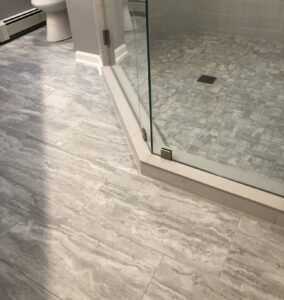When embarking on a basement remodeling project, choosing the right flooring is a critical decision. The basement’s unique environment, often prone to moisture and cooler temperatures, requires flooring materials that are durable, moisture-resistant, and comfortable. If you’re working with a basement remodeling contractor in Frederick, MD, they can guide you in selecting the best option based on your budget, design preferences, and the intended use of the space. Here’s a breakdown of the top flooring options for basements and their pros and cons.
1. Luxury Vinyl Plank (LVP)
Luxury vinyl plank is one of the most popular choices for basement flooring due to its durability and water resistance.
Pros:
- 100% waterproof, making it ideal for basements prone to moisture.
- Mimics the look of hardwood without the risk of warping.
- Easy to install, often as a DIY project.
- Low maintenance and durable against heavy foot traffic.
Cons:
- Can feel cold underfoot unless paired with a thermal underlayment.
- Quality varies across brands, so choose a reputable manufacturer.
2. Carpet Tiles
Carpet tiles offer a cozy solution for basements that are used as living spaces, such as family rooms or playrooms.
Pros:
- Easy to install and replace if damaged.
- Provides warmth and sound insulation.
- Available in various colors and patterns for customization.
Cons:
- Susceptible to moisture and potential mold growth in damp basements.
- Requires regular cleaning to maintain its appearance.
3. Engineered Wood
Engineered wood provides the elegance of hardwood while being more resistant to moisture.
Pros:
- More stable than solid hardwood in humid environments.
- Adds value and a premium feel to your basement.
- Available in a wide range of finishes.
Cons:
- More expensive than other flooring options.
- Not fully waterproof, so spills and flooding need immediate attention.
4. Ceramic or Porcelain Tile

Bathroom tile floor in Frederick, MD
Tile is a durable and water-resistant choice, especially for basements with higher moisture levels.
Pros:
- Completely waterproof and easy to clean.
- Long-lasting with proper installation and maintenance.
- Comes in a variety of styles and colors, including options that mimic stone or wood.
Cons:
- Can feel cold and hard underfoot, requiring area rugs or heated floors for comfort.
- Labor-intensive to install, which may increase costs.
5. Epoxy Flooring
Epoxy flooring is a sleek, industrial-style option often used in basements that double as workshops or home gyms.
Pros:
- Seamless, waterproof, and resistant to stains.
- Easy to clean and maintain.
- Highly durable and long-lasting.
Cons:
- Limited design options compared to other materials.
- Professional installation is recommended for the best results.
6. Rubber Flooring
Rubber flooring is ideal for home gyms or play areas due to its durability and cushioning.
Pros:
- Shock-absorbent and comfortable underfoot.
- Resistant to moisture and mold.
- Easy to clean and maintain.
Cons:
- Limited aesthetic appeal for more formal basement spaces.
- Can emit an odor initially, though it typically fades over time.
Final Thoughts
Selecting the best flooring for your basement depends on your specific needs and the primary use of the space. Whether you’re creating a cozy family retreat or a functional workout area, partnering with a knowledgeable basement remodeling contractor in Frederick, MD, ensures that your flooring choice will be both practical and stylish. With the right materials, your basement can become a versatile and valuable part of your home.

